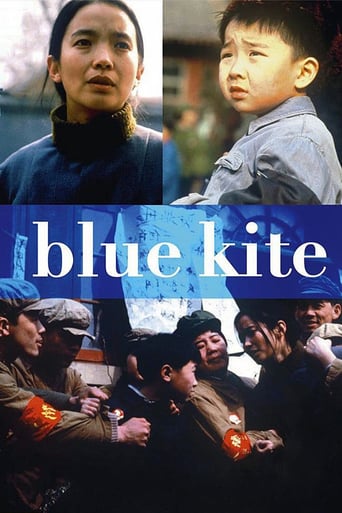G K
Director Tian Zhuangzhuang combines lucidity of vision with a novelistic richness and complexity of narrative. In a story based on the director's own memories, a young boy recounts his family history over two decades, his mother's multiple marriages and the political turmoil of those times.Banned by the authorities in China, the story traces the devastating effects of Mao Zedong's era, particularly the Cultural Revolution, has on ordinary Chinese lives. It combines a sharp sense of anger at the seemingly arbitrary political upheavals, and sorrowful sympathy for lives that are wasted or ruined.
BeckyLadakh
I use movies for teaching, i.e. I show movies from different parts of the world to my students in a remote rural part of India. Last year I showed the Blue Kite but found it was a bit too slow moving and unrelentingly grim. Then I showed To Live, which covers a similar part of history in a similar plot, and found it much easier to watch. I'm not saying that this movie is not great, just that for teenagers, the Blue Kite is a bit too slow.With both of these movies I think it is essential to know background information about the periods of history covered. The things that were done in China of those decades are so hard to believe and fathom. If you are interested in China of the 20th century, this movie is essential.
James Bee
According to some sort of reason, I didn't know this movie until these days. After watching it, I cannot stop thinking this might not be true, but I know it is a real story. Or I'd rather say "they are real" because this kind of story almost happened in every Chinese family.It might be fortunate that I'v got a complete family, but I can imagine what would happen if they, my parents, were not so lucky.Everything in the story are as real as they might be. To stigmatize and to be stigmatized, to live and to die, to resist and to be resisted, to beat and to be beaten while life was still going on. Attacking the rightists, perish the four vermins, big lunge, making steel, disasters of 3 years... all these things were filled in the daily conversations of Chinese nowadays.but I don't think we'v paid enough attention to this period of Chinese history. Especially young people do not even know it. This movie is still forbidden in China. Willing to see its public show.
Howard Schumann
" The stories in the film are real, and they are related with total sincerity. What worries me is that it is precisely a fear of reality and sincerity that has led to the ban on such stories being told." - Tian ZhuangzhuangThe Blue Kite, a beautiful and courageous 1993 film by Tian Zhuangzhuang, describes the ups and downs in the lives of a young Chinese family from the early 1950's through the Cultural Revolution of 1966. The film, which has not been seen in China, deals with the social upheavals caused by the Rectification Movement, the Great Leap Forward, and the Cultural Revolution, three events in recent Chinese history whose effects for good or ill are still being debated. Narrated by their rambunctious young son Tietou ("Iron Horse"), this is a political film about ideological excess, but it is also about the strength of family and the love of a mother for her son. Tietou, played by three different actors (Yi Tian, Zhang Wenyao, and Chen Xiaoman), tells how the swirling tide of political events caused uncertainty and disillusionment among the villagers. Tietou's mother, Shujuan, brilliantly portrayed by Lu Liping, is a tower of strength who must care for her son while coping with the sudden death of three husbands, indirectly due to the political turmoil. As the film begins, the drafting of citizens for manual labor is shown as part of the party's Rectification Movement, publicized through the mass media as an effort to remove "bourgeois" influences from professional workers. Shujuan's first husband, Shaolong (Pu Quanxin) falls out of favor with the Rectification Committee for his views (and because he has to go to the bathroom at an inopportune time). He is sent to a labor camp where he is accidentally killed by a falling tree. Her second husband, Uncle Li (Xuejian Li), dies of liver disease after confessing his role in reporting Shaolong and sending him to the labor camp. Shujuan then accepts marriage from a quiet intellectual named Lao Wu (Baochang Guo). During this time (1966-69), high school students, known as the Red Guard or hong wei bing militants, were organized to promote revolutionary enthusiasm and political purity by turning against "outdated" values taught by the teachers in their schools. They soon spread from the classrooms and became roving gangs, closing shops and schools and parading errant professors through the streets. Tian depicts the excesses of the Red Guard in bullying and beating those whom they deemed to lack "political purity". For example, Lao is denounced as reactionary by the Cultural Revolution and is arrested and beaten by Red Guards. Some claim that actual physical violence never occurred during this period. What is certain, however, is that the campaign led to the emergence of factions that believed they had the right to impose their beliefs on others.The Blue Kite is a powerful and involving film that says much about how ideological self-righteousness can undermine the things that are most precious -- a mother's love for her son, the strength and resilience of the family, and the right to speak our minds without fear of repression. The enduring values represented by the symbol of the blue kite are contrasted with the red banners and their changing political message. When the kite is caught in a tree, Tietou's father promises him, "I can make another for you"; by the end, Tietou makes a similar promise to a small child. And so it goes.


